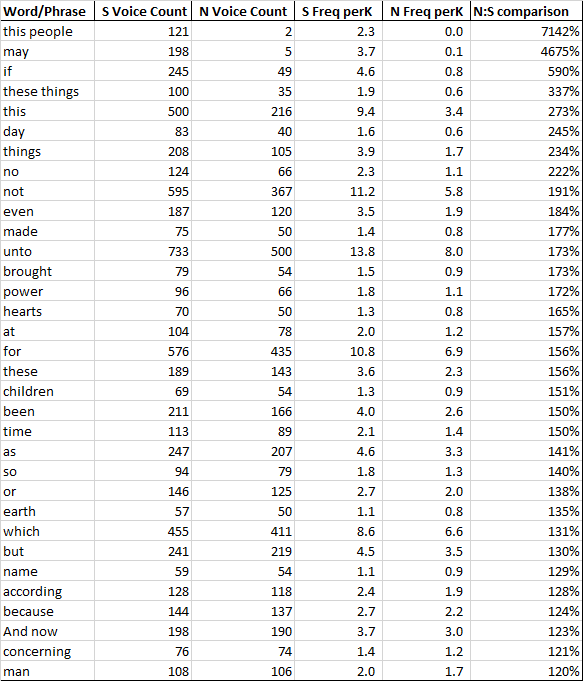Book of Mormon Three Voice Hypothesis — deeper analysis of the S Voice

S Voice Speakers of the Book of Mormon: King Benjamin, Abinadi, Alma, Amulek, Captain Moroni, Samuel the Lamanite
This is the third in a series of posts defining the Book of Mormon Three Voice Hypothesis, based on computer wordprint analysis of BOM text. The Book of Mormon Three Voice Hypothesis is that the Book of Mormon has three distinct voices: N (Narrative), S (Sermon), and L (Late). The N and S is divided between the N Voice of third person narrative and S Voice first person ’embedded documents’ (borrowing this term from Grant Hardy’s Understanding the Book of Mormon which helped me start to view the Book of Mormon in a deeper way which led to this analysis). When viewing the Book of Mormon in Mosiah priority order, the first half of the Book of Mormon (ie Mosiah through the end of Alma) has the purest distinction of these two voices. The third voice is the L Voice (Late), which starts to appear at the end of Alma and ramps up progressively, maximizing its influence in Nephi’s writings. Analysis of the L Voice will be in a future post.
The first two posts in the series :
Introduction to the Book of Mormon Three Voice Hypothesis
Definition of the N Voice and comparison to S Voice
Review of definition and methodology
I developed a database of Book of Mormon text divided by S (sermon) and N (narrative). See the introductory post for a review of this methodology, as well as the code for charts included here. Aided by the Voices in the Book of Mormon database created by John Hilton III, Shon Hopkin, Jennifer Platt, Randal Wright, and Jana Johnson, I separated out each verse, and in some cases even drilling into a verse, the narrative (N) voice with the sermon (S) voice. I identified some unique characteristics and trends and created a bunch of charts and tables from this data that illustrate these.
Passages identified as S and N
Going in Mosiah priority order, the Book of Mormon starts with Mosiah. When viewing this way, for the first half of the Book of Mormon, Mormon is the narrator. The S and N is broken out by verse and sometimes sub-verse. Here is the breakout by chapter of percentage each of S and N.

The major S voices are: King Benjamin, Abinadi, Alma, Amulek. I’m focusing on the first half of the Book of Mormon (Mosiah priority order), but Samuel the Lamanite’s chapters should probably included as they have very strong S Voice characteristics. Mormon’s voice is taken as N except for the a few small passages reversed to S. All non-Mormon voices are allocated to S, except for a couple passages from Zeniff and Helaman with strong N voice characteristics (ie written in third person, past tense with ‘came to pass’, etc).
S Voice Characteristics
S Voice is characterized by:
- use of first person, present tense
- use of Bible, formal language: shall, ye, hath, doth
- religious content, especially very specific doctrinal exposition related to the atonement of Jesus Christ
- frequent use of the common words: if, for, not, no, even, things, this
- frequent use of rhetorical questions to illustrate doctrinal teachings
- common use of ‘ye shall’, ‘for behold’, ‘I say unto you’
- use of unique vocabulary and phrases not found in the 62,747 word sampling of N voice content: ‘state of’, ‘that which is’, ‘this land’
- use of unique vocabulary and phrases with >10 times more frequency than N voice: ‘somewhat’, ‘saved’, ‘and if’, ‘Lord God’, ‘face of the earth’
Predictive Model
I put together a predictive model by using words that correlated strongly to the embedded documents text (ie King Benjamin, Alma, Limhi, Abinadi, etc), using the Book of Mormon Voices Database and words that correlated strongly to the Mormon voice. I also included words that correlated to the second half portion L Voice. I tried to remove words that would be too obvious correlations, simply by the context. ie I excluded ‘ye shall’ and ‘it came to pass’ or ‘behold’. The words I used:
| S Voice | N Voice | L Voice (+ score) | L Voice (- score) |
| at this | all the | all other | at this |
| because | began to | and after | caused |
| even so | caused | angels | church |
| everlasting | did | by faith | Now |
| except | over | by the power | on the |
| forever | over the people | charity | only |
| if | round about | children of men | or |
| iniquities | that after | did | over |
| mankind | that when | face of | over the people |
| may | themselves together | flesh | round about |
| mercy | those | Gentiles | themselves together |
| moreover | throughout all | Holy One of Israel | those |
| must | thus | inheritance | those who |
| no | took | Jews | thus |
| not | who had | Lamb of God | to their |
| of death | who were | like unto | took |
| only | Messiah | ||
| repentance | more part | ||
| state | most | ||
| such | multitudes | ||
| that which | must | ||
| the knowledge of the | plain | ||
| thereby | save it | ||
| these things | seat | ||
| this land | seed | ||
| unto this | seventy and | ||
| whether | space | ||
| who are | spake | ||
| would | that in | ||
| things which | |||
| unto the | |||
| years had passed |
Then I mapped out each chapter according to the score which produced this :

S Voice = Blue, N Voice = Red, L Voice = Yellow. You can see how the N-S correlates to the chart above, and also shows the L Voice starting slow and trending up.
Usage charts for selected words and phrases:
‘State of‘ is one of those phrases unique to the S vs N. Found 24 times in the S portion and none in the N. Each bar represents a 2,000 word block. The top chart is for the entire BOM. The second is just for the N Voice portion. The third is for the S Voice portion.

Though it is not found in the 62,747 word N Voice portion, it seems to appear consistently across S Voice speakers King Benjamin, Abinadi, Alma, etc, even in one of the few passages in this portion where Mormon addresses the audience and shifts from N to S voice. I think it’s more appropriate to treat these as one combined voice than multiple, unique voices.
Mosiah 3:25 King Benjamin speaking:
25 And if they be evil they are consigned to an awful view of their own guilt and abominations, which doth cause them to shrink from the presence of the Lord into a state of misery and endless torment, from whence they can no more return; therefore they have drunk damnation to their own souls.
Mosiah 16:5 Abinadi speaking:
5 But remember that he that persists in his own carnal nature, and goes on in the ways of sin and rebellion against God, remaineth in his fallen state and the devil hath all power over him. Therefore he is as though there was no redemption made, being an enemy to God; and also is the devil an enemy to God.
Alma 9:11 Alma speaking:
11 Yea, and if it had not been for his matchless power, and his mercy, and his long-suffering towards us, we should unavoidably have been cut off from the face of the earth long before this period of time, and perhaps been consigned to a state of endless misery and woe.
Alma 28:12 Mormon speaking:
12 While many thousands of others truly mourn for the loss of their kindred, yet they rejoice and exult in the hope, and even know, according to the promises of the Lord, that they are raised to dwell at the right hand of God, in a state of never-ending happiness.
Alma 34:35 Almulek
35 For behold, if ye have procrastinated the day of your repentance even until death, behold, ye have become subjected to the spirit of the devil, and he doth seal you his; therefore, the Spirit of the Lord hath withdrawn from you, and hath no place in you, and the devil hath all power over you; and this is the final state of the wicked.
Alma 42:1 Alma speaking:
1 And now, my son, I perceive there is somewhat more which doth worry your mind, which ye cannot understand—which is concerning the justice of God in the punishment of the sinner; for ye do try to suppose that it is injustice that the sinner should be consigned to a state of misery.
Religious words. This is the sum total of frequencies for the words:
atonement, damnation, devil, eternal, eternally, eternity, evil, filthiness, filthy, forever, happiness, hell, holiness, immortal, immortality, incorruption, infinite, justice, mercies, merciful, mercy, miserable, misery, mysteries, path, priesthood, redemption, repentance, restoration, resurrection, righteousness, sacrifice, salvation, spiritual, spiritually, state, temporal, temptations, unclean, works

What’s surprising is not that these words are frequent in the S Voice but how infrequent they are in the N Voice. As expected, these 40 words appear total of 725 times in S Voice. But only 92 times in the N Voice, or once every 682 words combined. Mormon, in his narrating, almost completely leaves the religious content to the quoted sections in the S Voice.
if:


This is a real head scratcher. It’s understandable that in a sermon setting, a speaker might use the word ‘if’ quite often to show consequences of actions. But the word if is a common word and seems like it would be used in any setting, ie to narrate a story, as well as preach a sermon. Six times more common occurrence, and even distribution across all S Voice speakers, is quite remarkable.
may:


these things:
 .
.

I tried to illustrate vocabulary and phrases that aren’t cherry picked due to context. ie ‘I say unto you’, any verb in present tense, any first person prepositions like ‘you, ye, I, we’ have much higher frequencies in the S Voice, but that would be obvious due to context. Words and phrases like ‘except’, ‘somewhat, or ‘these things’ don’t seem intuitive like that, and so are better to illustrate this S vs N Voice phenomenon.
except:


This word also is an example of the L Voice, which I will dissect in another post. The L Voice is the Late Voice that starts in the book in late Alma and trends upward, maximized in Nephi’s writings. This word except seems to one that is unique to the S voice and tapers off, not being preferred by the L Voice.
somewhat:


The word somewhat has somewhat (haha) common usage across multiple voices in the S Voice, used by: King Benjamin, Father of Lamoni, Amulek, Alma, Captain Moroni, and Pahoran. But only a single occurrence in the 62,747 word N Voice dataset, Alma 53:10.
10 And now behold, I have somewhat to say concerning the people of Ammon, who in the beginning, were Lamanites; but by Ammon and his brethren, or rather by the power and word of God, they had been converted unto the Lord; and they had been brought down into the land of Zarahemla, and had ever since been protected by the Nephites.
But then, this verse probably should have been classified as a rare Mormon S Voice. ‘and now behold’ and first person usage are strong characteristics of S Voice.
This is also a good L Voice illustration, showing the purity of the first half of the BOM S-N Voice, and then a progressive change after that with L Voice. Mormon uses the word ‘somewhat’ not a single time through Alma 52, covering 52,310 words. Mormon uses the word ‘somewhat’ 12 times after that, covering 44,777 words.
Usage of common words:
I did this in the post defining the N Voice, showing the words that were heavier used in N Voice. This is the same chart but showing the words used more frequently in S Voice. I took all words and phrases with > 100 count and compared them between N Voice and S Voice. I removed the words/phrases obviously heavily weighted towards S or N due to context or being part of the catch phrases like “came to pass”. Some of these are a little surprising.

Conclusion:
By the end of these series of posts, I hope to clearly show the distinction of these three voices in the Book of Mormon: N,S,L. I don’t have enough data or expertise to show the likelihood that these voices could be created by the same author, or whether it is evidence of multiple authors. My hunch is that it could be written by one author, but I still find it very interesting how distinct these voices are, and I believe this model gives insight into the text of the Book of Mormon.